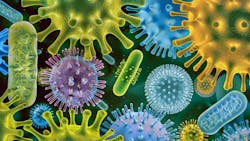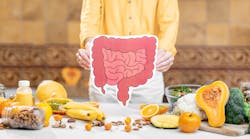Unlocking the power of abiotics, prebiotics, probiotics, and beyond
Abiotics, probiotics, prebiotics, synbiotics, and psychobiotics are promising strategies for preventing and treating dental caries and periodontal disease by restoring the balance of the oral microbiome. While research suggests these biotics can reduce levels of cariogenic and periodontal pathogens, control inflammation, and improve oral health outcomes, further studies are needed to fully explain their mechanisms of action and long-term effects in the unique environment of the oral cavity.
Abiotics
An abiotic is a nonliving organism in the ecosystem. Examples include temperature, light, pH, available nutrients, oxygen, and water. Although not well studied, it is known that temperature can have a direct effect that modulates the growth and virulence of gastrointestinal pathogens.1 Although the oral cavity is rich in oxygen, most oxygen in the oral cavity is dissolved in the saliva and readily available to microorganisms for their metabolic needs.2 All of these abiotic factors play a significant role in the human gut and oral microbiome.
Antibiotics
While they are lifesaving in many situations, the indiscriminate use of antibiotics can disrupt the delicate balance of the gut microbiota and lead to dysbiosis. This imbalance may result in digestive issues, susceptibility to infections, and even antibiotic resistance. Additionally, certain antibiotics can impact oral health by altering the oral microbiome, potentially leading to conditions like oral thrush and dental caries.
Postbiotics
Postbiotics are gaining attention for their potential benefits to oral health. In addition to suppressing pathogens that cause and spread disease, they stimulate flora that promotes health.3 Probiotics have anti-inflammatory properties, enhance oral immunity, strengthen the oral mucosa, promote balance in the oral microbiome, and reduce dental biofilm. Probiotics can also help mitigate changes associated with increased gut permeability, and have shown promising results in reducing anxiety and depression when supplemented.4
Prebiotics
Gibson and Roberfroid coined the term "prebiotics" in 1995 when they used lactobacillus and bifidobacterium to modify the human colon, thereby providing health-promoting benefits.3 Prebiotics are nondigestible fibers that serve as food for probiotics, which promotes their growth and activity in the gut. Sources of prebiotics include fruits, vegetables, whole grains, and legumes.
Probiotics
Probiotics can influence oral health through several potential mechanisms. They may compete with pathogenic bacteria for adhesion sites and nutrients, thereby preventing their colonization of tooth surfaces. Probiotics effectively inhibit periodontal pathogens and biochemical markers associated with inflammation, such as interleukin.3
Psychobiotics
Psychobiotics are a class of probiotics that have potential benefits for mental health. According to a 2018 report from the World Health Organization, depression affects more than 300 million people worldwide. These beneficial bacteria, and sometimes yeasts, are believed to produce or stimulate the production of neurotransmitters and other biologically active substances that influence brain function and mental well-being through the gut-brain axis.
Microbiome studies have identified numerous potential psychobiotic strains, with short-chain fatty acid (SCFA) producing bacteria and garnering particular interest from neurobiologists.5 These specialized probiotics produce neurotransmitters and other compounds that alter brain function and mood.
Synbiotics
Synbiotics are a combination of prebiotics and probiotics. Symbiotics assist in reducing dental caries through an oral and systemic approach. Human consumption of synbiotics has various health benefits, such as increased levels of lactobacilli and bifidobacteria, improvement of immune-modulating ability, prevention of bacterial translocation, and reduction in the incidence of nosocomial infections.6
Strengthen your oral and gut microbiome
Abiotics, prebiotics, postbiotics, probiotics, psychobiotics, and synbiotics play crucial roles in maintaining a balanced microbial environment in the gut and oral cavity, influencing digestion, immunity, and mental health. Understanding these components and their relationship is essential for optimizing health outcomes.
As research in this field evolves, harnessing the power of the gut and oral microbiomes holds promising potential for improving patients’ health in comprehensive ways.
References
- Huus KE, Ley RE. Blowing hot and cold: body temperature and the microbiome. ASM Journals. 2021;6(5):e0070721. doi.10.1128/mSystems.00707-21
- Santacroce L, Passarelli PC, Azzolino D, et al. Oral microbiota in human health and disease: A perspective. Exp Biol Med. 2023;248(15):1288-1301. doi:10.1177/15353702231187645
- Shirbhate U, Bajaj P, Chandak M, et al. Clinical implications of probiotics in oral and periodontal health: a comprehensive review. Cureus. 2023;15(12):e51177.. doi:10.7759/cureus.51177
- Lassmann Ł, Pollis M, Żółtowska A, Manfredini D. Gut bless your pain—roles of the gut microbiota, sleep, and melatonin in chronic orofacial pain and depression. Biomedicines. 2022;10(7):1528. doi.10.3390/biomedicines10071528
- Cheng Y, Liu J, Ling Z. Short-chain fatty acids-producing probiotics: A novel source of psychobiotics. Crit Rev Food Sci Nutr. 2022;62(28):7929-7959. doi:10.1080/10408398.2021.1920884
- Konde S, Ravindran S, Agarwal M, Peethambar P. Prebiotics: a primeval measure to combat dental caries: a short-term clinical study. Int J Clin Pediatr Dent. 2022;15(Suppl 2):S234-S238. doi:10.5005/jp-journals-10005-2165
About the Author

Lacy Walker, BS, RDH, CDA, MAADH, FAAOSH,
Lacy Walker, BS, RDH, CDA, MAADH, FAAOSH, is an international speaker, author of the book Choices, and owner of Shared Hygiene. She’s worked in periodontal, psychiatric hospitals, cosmetic, DSOs, and general private and military practices. Lacy is the CE director for A Tale of Two Hygienists podcast and the public relations chair, president-elect for the American Academy of Dental Hygiene, and one of the founding members of RDH Connect. She's passionate about the oral-systemic connection. Contact her at [email protected], @lacyrdh, @shygienist, or visit sharedhygiene.com.


